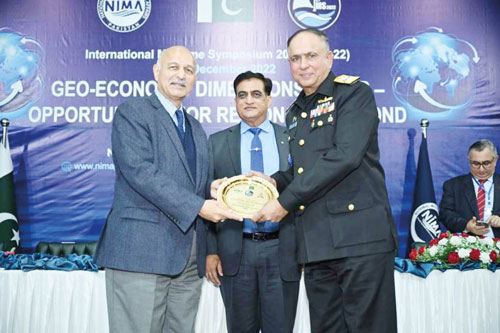National Institute of Maritime Affairs (NIMA), Islamabad organised two-day International Maritime Symposium (IMS), on the topic “Geo-economic Dimensions of Indian Ocean Region (IOR) – Opportunities for Region and Beyond” recently. Experts from home and abroad presented their views about the geo-economic importance of IOR.
The focus of second day proceeding was on maritime security in the context of regional connectivity.Air Marshal Zahid Mahmood, vice chief of Air Staff was the chief guest. Whereas Vice Admiral Abdul Aleem(Retd)moderated the session discussion.
Vice Admiral (Retd) Iftikhar Rao spoke about the Maritime Threats &Challenges in Regional Perspective. He talked about the Malacca strait choke point and its importance to the world, especially to China. He also emphasized that Gwadar is a commercial portand its security is vital for economic dividends.
Dr. Christian Beuger, of University of Copenhagen, talked about the Security of Sea lines of Communications (SLOCs) and emphasized collaborative strategy in IOR to meet the non-conventional threats, particularly to SLOCs.
He opined that Pakistan is in a position to take the lead in this regard. While delivering talk, Prof. Dr. Azhar Ahmed, of Bahria University, was of the view that Geo- Economics is an instrument to achieve objectives of Geo-Politics. He underscored that without political stability no country can progress.
Air Marshal Zahid Mahmood highlighted the importance of maritime security and its linkage with national security. He emphasized on the need of developing operational strategies to meet the maritime security threats. Dr. Hassan Daud Butt, of Bahria University, spoke about the need of regional connectivity, both on land and over sea.
Senator Mushahid Hussain Syed, key note speaker, while deliberating on the current global security scenario, opined that it is the most dangerous decade after World War II. World is witnessing historic changes;economic and global powers are emerging from East. He was of the view that next war is expected to be at sea and not on land, therefore, Pakistan needs to ensure fool proof maritime security.
The message of Prime Minister of Pakistan was also read out during the session. While emphasizing the Maritime Security of Pakistan, PM opined that Pakistan is heavily dependent on its sea lines of communications because over 90% of Pakistan’s trade and almost 100% energy imports are through sea. Therefore, any disruption in maritime trade has serious repercussions for the national security. The government is well aware of this imperative and is providing all out support to maritime security apparatus especially to Pakistan Navy.
Vice Admiral Faisal Rasool Lodhi, ViceChief of the Naval Staff was the chief guest of the closing session. He emphasized that effective security is essential to protect the expanding maritime economic activities in Pakistan, region and beyond. Pakistan, therefore, needs proactive diplomacy, well considered economic policies and risk management as important ingredients to harness and sustain the pace of development and potential growth.
The symposium was well attended by maritime professionals, security experts, academia, think tanks and media personnel.










